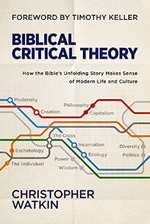 Biblical Critical Theory
Biblical Critical Theory
Christopher Watkin
Zondervan Academic, 2022
Reviewed by Tim Collison
I was in Koorong with every Australian Christian’s favourite present: a Koorong Gift Card. I’d recently heard Dr Christopher Watkin speak about why Augustine’s ‘City of God’ was the first critical theory. My plan was to buy his most recent book, which I had heard many good things about. In my memory it is the most talked about book in Evangelical circles since Timothy Keller’s ‘Reason for God’.
This seemed to be borne out when I went to the counter to request a copy, after finding none on the shelves. The sales assistant thought they had put a lot out that day. They were selling fast. It is difficult for any book to live up to such pressure!
My short review is that ‘Biblical Critical Theory’ is worth reading. It may take six or seven weeks, but it rewards the time spent in it. Dr Watkin defines what he wants to do in his introduction: a critique of our culture. Then how the story of the Bible helps us understand, unpack, and critique it. He does this by ‘interweaving reflections on the unfolding biblical storyline with examinations of modern life and culture’ (p.25).
Dr Watkin’s pedagogical background shows in how he scaffolds understanding. Each chapter has a series of questions to help the reader engage with and reflect on what they have read. It also means some (very intense) small groups would find this an interesting way to explore this book.
All readers will find something that will interest them in this book. Dr Watkin builds his narrative through the book, but it is possible readers could read a section out of order.
The usefulness of this book is also found in its ability to make the reader think. There will be ideas or thoughts which may be new to the reader, or difficult to understand. The reading will stick with you and provoke new ideas and pathways of thinking. Or at least it did for this reader! The final quarter of the book was where I found the most mileage. Dr Watkin has the same ability as Timothy Keller to synthesise and share from his own engagement with authors many of us would never read. Many people will be familiar with the inevitable quoting of C.S. Lewis, but he also engages with and exposes the reader to a wide range of other thinkers running from Arendt to Zizek. In the final quarter I found his engagement with Foucault around the idea that ‘sexuality has become more important to us than our soul’ (p.515) particularly compelling.
While Dr Watkin hopes that this book will also help non- Christians engage in a fresh way with Christianity. Like Keller’s ‘Reason for God’ and Lewis’ ‘Mere Christianity’ it will be most helpful shaping the thinking of Christians for their discussions with those who don’t yet know Jesus.
Tim Collison, is curate at St Mark’s Camberwell, Melbourne
